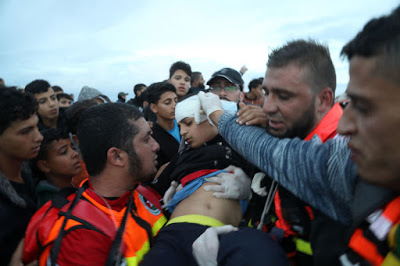Israel twists law to dodge ICC probe
 |
| Maureen Clare Murphy 30 May 2019 |
Israel is relying on US muscle to stop the International Criminal Court investigating alleged war crimes perpetrated in the occupied West Bank and Gaza Strip.
“The International Criminal Court in The Hague has no jurisdiction to discuss matters concerning the Israeli-Palestinian conflict,” Sharon Afek, Israel’s military advocate general, stated at the annual Herzliya Conference, a high-profile gathering of Israel’s political and military elites, this week.
“Israel is a law-abiding country, with an independent and strong judicial system, and there is no reason for its actions to be scrutinized by the ICC,” Afek added.
The military advocate general’s office also recently published a report claiming that the military had conducted “lectures and workshops on the legal ramifications” of occupation forces’ actions, the Tel Aviv daily Haaretzstated.
“The move was prompted by weekly clashes between soldiers and Palestinians over the past year as well as by the International Criminal Court’s scrutiny of the [military’s] actions in the 2014 Gaza war,” Haaretz added.
The situation in the West Bank and Gaza Strip has been under preliminary examination by the International Criminal Court since 2015. Its chief prosecutor issued an unprecedented warning to Israeli leaders last year that they may face trial for the killings of unarmed protesters in Gaza.
More than 200 Palestinians, including 44 children, have been killed during the Great March of Return protests in Gaza and thousands more injured. Some 1,400 Palestinians were shot by live ammunition during protests on 14 May 2018 alone, the deadliest single day of protests since they were launched earlier that year.
Judges in The Hague have also ordered the International Criminal Court to reach out to victims of war crimes in Palestine.
Fig-leaf investigations
Afek has ordered a military police probe into the killing of 11 Palestinians during the Great March of Return.
Israel keeps up the appearance of a robust internal investigative apparatus to ward off accountability in international courts. Human rights groups have characterized the Israeli military’s investigations of its violations against Palestinians as a whitewashing mechanism.
Earlier this month the military closed its probe into the killing of Ibrahim Abu Thurayya, a double amputee shot in the head during a protest in December 2017.
In September 2016, the Palestinian human rights group Al-Haq stated that “Since 1987, no Israeli soldier or commander has been convicted of willfully causing the death of a Palestinian in the [occupied West Bank and Gaza Strip].”
Since then there have been two convictions – both in high-profile cases where the slaying was captured on video.
In 2017, Israeli army medic Elor Azarya received 18 months for the point blank execution in 2016 of Abd al-Fattah Yusri al-Sharif in the West Bank city of Hebron. That sentence was later reduced by a third.
Ben Dery was sentenced to nine months in prison last year for what Defense for Children International Palestine described as “a willful killing” of 17-year-old Nadim Nuwara during protests outside a West Bank military prison in May 2014.
Twisting the law
During his remarks at the Herzliya Conference Afek accused the Hamas authorities in Gaza of sending thousands of people “to breach the border fence.”
“This raises substantive legal questions, including what is the appropriate legal framework according to which the army needs to respond,” he added.
Israel has attempted to justify its use of lethal force against Gaza protesters by saying that the demonstrations and its deadly crackdown are part of an armed conflict with Hamas.
An independent commission of inquiry launched by the United Nations, as well as Palestinian human rights groups, have refuted this. They say that the mass demonstrations along Gaza’s boundary with Israel are a civilian matter of law enforcement governed by international human rights law. The killings and maiming of protesters can, therefore, not be excused by claiming that they took part during an armed conflict.
The commission of inquiry prepared a confidential file containing dossiers of alleged perpetrators of international crimes related to the Great March of Return for submission to the International Criminal Court.
Israel has relied on threats and bullying from the US to deter a full investigation by the ICC.
Paul Ney, general counsel of the US Department of Defense, also spoke at the Herzliya Conference in what Haaretz described as “a coordinated legal attack against the jurisdiction of the International Criminal Court” by the US and Israel.
Ney said that the US “has in no way consented to any exercise of jurisdiction by the ICC” and that its consideration of allegations against US personnel is viewed “as a flagrant violation of our national sovereignty and as an attack on America’s rule of law.”
ICC gives in to bullying
In April, the ICC’s pre-trial judges decided unanimously against opening an investigation into war crimes in Afghanistan, citing the poor prospects “of securing meaningful cooperation from the relevant authorities,” referring to the US.
The announcement came days after the US revoked the International Criminal Court chief prosecutor’s visa.
US President Donald Trump warned that “Any attempt to target American, Israeli, or allied personnel for prosecution will be met with a swift and vigorous response.”
At the Herzliya Conference, Ney said that the ICC has no jurisdiction to prosecute alleged international crimes by Israel and the US because neither state is a party to the Rome Statute, the treaty that established the court.
The US has also taken punitive and coercive measures against the Palestine Liberation Organization over efforts to see Israel prosecuted at the ICC, including the closing of its mission in Washington last year.
The Palestinian Authority acceded to the Rome Statute in 2015, accepting ICC jurisdiction over alleged crimes committed in the Gaza Strip and West Bank, including East Jerusalem, since 13 June 2014.


